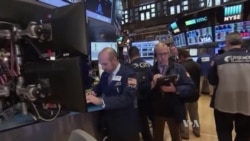Concern and uncertainty about elections affect the economy, and a researcher says their effect on business has been increasing. Data show stock markets more volatile during election season, while other research shows both consumers and corporate leaders delay purchases, decisions and investments when the path ahead is unclear. But there is some debate about how to gauge the impact that political uncertainty has on the overall economy.
What happens on the campaign trail, with conflicting promises on taxes, trade, and other issues, has a real impact on markets, according to the research firm, Macroeconomic Advisers.
The S&P 500 has changed throughout the campaign as the fortunes of the candidates changed. Joel Prakken said via Skype that markets seemed to prefer a Hillary Clinton victory.
"As the odds of a Clinton victory rose, at least as recorded in the polls, we saw the market rally, and if the odds of a Clinton victory receded, we saw the market retreat," said Prakken.
The market and economic impact of politics and political uncertainty has grown, according to University of Iowa finance professor Art Durnev, who spoke via Skype.
"Politics affects financial markets much, much more now than, let’s say, 10, 20 or 30 years ago," said Durnev.
That's because uncertainty about taxes and rules has an impact on the factory floor.
Research shows worried managers delay important corporate actions like the timing of stock offerings.
"They hold up on investment, they start hoarding cash, they don't want to spend. Major corporations delay their hiring, their firing decisions. Everything is on hold for them,” said Durnev.
Uncertainty also affects consumers who power a lot of economic activity, according to Macroeconomic Advisers' Joel Prakken.
"Buying a car, buying a house, starting a business, managing a business, making investment decisions, when they are uncertain about the environment in which they will be making those decisions, there is a natural tendency to take a pause, take a break, sit on your hands, and wait until the uncertainty clears," said Prakken.
But experts wonder if political uncertainty has a larger or smaller impact than energy costs, interest rates, or corporate guesses about future demand for products, according to Brookings scholar Bill Galston.
"There is a lot of professional disagreement among economists as to how weighty uncertainty is in relationship to more fundamental market evaluations," said Galston.
Political uncertainty won't end with the election. For example, if Democrat Hillary Clinton wins, she will have to get her program past Congress, where one or perhaps both houses may be controlled by skeptical Republicans.




























